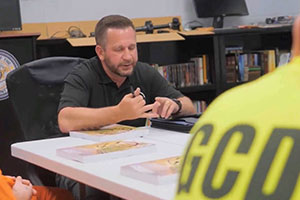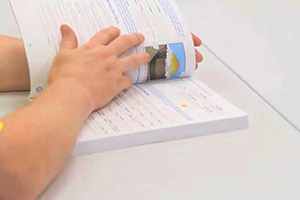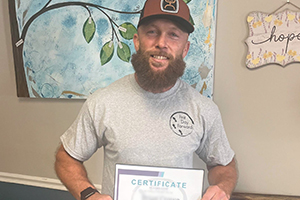First Day Forward
- Need: Enhanced support for people with substance use disorders leaving jail and reentering communities in rural northeastern Kentucky.
- Intervention: A reentry program that uses peer support specialists to teach cognitive life skills, obtain essential identification documents, and help people create and follow personalized case plans before and after their release.
- Results: More than 420 people have been served by First Day Forward, with recidivism rates significantly lower among people who successfully completed the program.
Description
To help people with substance use disorder (SUD) more easily navigate the transition from jail back into their home communities, the Northeast Kentucky Substance Use Response Coalition created First Day Forward (FDF), a reentry program serving seven rural counties, and one non-rural county, in northeastern Kentucky. FDF uses peer support specialists to teach cognitive life skills and to help people build and follow personalized case plans before and after their release.

FDF was established through a Health Resources and Services Administration (HRSA) Rural Communities Opioid Response Program (RCORP) Implementation II grant and has been continued through RCORP Implementation III and Implementation IV grants. The program was first implemented in Clark County in 2020, followed by Mason and Montgomery Counties in 2021, Powell County in 2022, and Rowan County in 2024. Implementation IV also began in Carter County in 2022. In addition to the counties funded through HRSA RCORP Implementation grants, the coalition also launched First Day Forward in Boyd and Greenup Counties with funding from the Pallottine Foundation of Huntington.
Services offered
Incarcerated people who are interested in FDF can fill out a screening application to determine whether they are eligible; to qualify for the program, applicants must anticipate living in one of the eight targeted counties after their release, must self-identify as having a SUD, and must demonstrate their willingness to participate in the program. If accepted, they begin working with a peer support specialist to develop cognitive life skills and to create personalized pre-release and post-release case plans; these meetings ideally start taking place within 90 days of their release. The peer support specialist can support the participant in finding employment opportunities and post-release treatment resources, getting naloxone training, and expunging criminal records, and can also help participants obtain essential forms of identification — such as an ID card, birth certification, a social security card, and a medical card — prior to release. These forms of identification are crucial as they are required for accessing various services and opportunities in society.
After the participant is released, the peer support specialist can give them a ride home from jail and help to connect them to community resources to find housing, employment, SUD treatment or self-help meetings, or primary care. The peer support specialist can also accompany the participant as needed to medical appointments, Narcotics Anonymous or Alcoholics Anonymous meetings, or appointments to apply for Medicaid, the Supplemental Nutrition Assistance Program, and other services.

Participants and peer support specialists have weekly in-person meetings for the first 30 days after release, biweekly in-person meetings for 31-60 days after release, and monthly phone calls 61-120 days after release.
Results
More than 420 people have been served by FDF as of February 2024, with about 70% of participants successfully completing the program. The program has seen an even greater interest in its services: More than 700 people who applied to FDF were deemed ineligible due to their anticipated discharge location being outside of the program's service area, being located in a non-rural area, or being charged as a violent offender.
Participants who successfully completed the program were three times less likely to be arrested again than participants who did not successfully complete the program, with recidivism rates of 23% and 75% respectively. Half of all participants were connected to additional SUD treatment.

Here's what one FDF participant had to say about the program:
“First Day Forward has helped me more than anything during my transition from incarceration to treatment, then back into society. I am so grateful to have a resource like this available to me and the people just like me who are truly serious about changing their lives. It would have been very difficult on me becoming stable and creating a stable household for my family without the housing opportunity, and the program all together. I am forever grateful!” – Brian, Clark County
Challenges
Transfers of inmates from one jail to another have presented challenges for FDF, especially when those transfers happen without warning. The program has also dealt with jail staff turnover and shortages at times.
The program was first implemented during the COVID-19 pandemic, which brought additional complications as local jails were under lockdown and face-to-face meetings were not possible. To build relationships with participants during the pandemic, the program utilized email, texting, and handwritten letters.
Replication
Program leaders recommend getting to know local jails and interviewing people incarcerated there about what kinds of support would be most helpful for them. They say peer support from people with lived experience has been vital to building relationships with participants.
Building partnerships across the communities FDF serves, and purposely growing public awareness of the program, have also been key to its success.
Contact Information
KaSandra Hanshaw, RCORP Implementation II and III Project DirectorNortheast Kentucky Substance Use Response Coalition
First Day Forward
606.783.6830
KaSandra.Hanshaw@st-claire.org
Topics
Appalachia
· Criminal justice system
· Human services
· Substance use and misuse
States served
Kentucky
Date added
March 20, 2024
Suggested citation: Rural Health Information Hub, 2024. First Day Forward [online]. Rural Health Information Hub. Available at: https://www.ruralhealthinfo.org/project-examples/1136 [Accessed 15 April 2025]
Please contact the models and innovations contact directly for the most complete and current information about this program. Summaries of models and innovations are provided by RHIhub for your convenience. The programs described are not endorsed by RHIhub or by the Federal Office of Rural Health Policy. Each rural community should consider whether a particular project or approach is a good match for their community’s needs and capacity. While it is sometimes possible to adapt program components to match your resources, keep in mind that changes to the program design may impact results.
